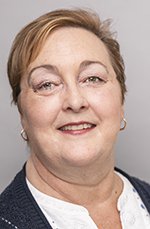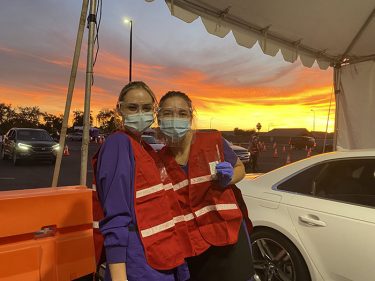
By Lana Sweeten-Shults
GCU News Bureau
Overnight, the world turned upside down, taking Grand Canyon University’s nursing students right along with it.
“I had students reaching out to me in a panic,” said Amy Leach, NCLEX Success Director for the College of Nursing and Health Care Professions, who recalled when the state began to shut down its testing sites for the National Council Licensure Examination during COVID-19 lockdowns.
Students who recently graduated from the University’s Nursing program could not earn their license to become a registered nurse – meaning they could not work in the field – without taking and passing the rigorous national exam.

The closure lasted only about two weeks, “but it was quite stressful," Leach said. "Some had exams that were canceled with no end in sight.”
Once test sites opened up, the state limited the number of students permitted to take the exam -- students who couldn’t prepare for the test as they normally would have because of the barriers COVID-19 presented.
Despite that, in a year of roadblock after roadblock, GCU’s nursing students excelled on the most recent NCLEX, scoring a 100% first-time pass rate on the test in the first quarter of 2021, meaning they passed the test on their first try. They also bested the state first-time pass rate for the quarter (90.42%) and outperformed bigger state universities.
And they did so in the middle of a global pandemic.
College leaders don’t know if GCU has ever hit that 100% first-time pass rate threshold before.
However, Dr. Lisa Smith, the college's dean, knows this is the first time the University’s students have achieved a 100% first-time pass rate on the NCLEX since she arrived here five years ago, and it's a major achievement for the college.
But she believes she knows the reason behind that perfect pass rate: the dedicated team of faculty and staff in the prelicensure program who, even when the world was shutting down, still were able to create a successful plan for their students.

“At one time, there was a national education act titled No Child Left Behind. It’s how we feel about our students,” said Smith. “We’re going to do everything we can to support our students.”
What that meant for the Nursing program was making a hard pivot, and then another and another. As the outlook of the pandemic changed, so did the direction of the college as it met COVID’s hurdles head on.
For one, when the University suddenly sent students home in March 2020 to finish the spring semester because of COVID-19 lockdowns, they did not have access to the immersive simulation lab, a suite of classroom spaces made to look like a real hospital floor. It’s where students practice real-life nursing scenarios to ready them for what they will be doing in their professional careers.
Instead of that hands-on experience, the faculty gathered videos of students in past simulations and analyzed those exercises online with their classes.
Then when hospitals closed their doors to students for a time, they could not complete another vital part of their hands-on training: their clinical rotations. During clinicals, students work alongside nurses and other health care professionals to get those invaluable, real-life experiences.
So the faculty turned to virtual simulations, which re-create being in a real hospital or other health care facility.
The college also asked students to delay their coursework, offering half of the curriculum it normally would in the summer of 2020 and the other half in the fall. The hope was that hospitals would reopen by then and clinicals would resume -- and some clinicals did. Smith and Assistant Dean Heather Ziemianski worked tirelessly with their hospital partners, pleading with them to let their students back in. Those who didn’t land a clinical placement still were able to complete state requirements virtually.

Another challenge: Students could not prepare for the NCLEX like they normally would have.
Leach, who would meet with students face to face before the pandemic, turned to meeting with them online or speaking with them on the phone. She dropped in on virtual classes, too, so students knew they had her as a resource.
Then there was the important three-day live NCLEX review that didn’t happen in person. The college’s faculty had to come up with an online version of the review.
“When we lost the face to face altogether, I was a little more nervous about student engagement and building their plans,” she said.
And she had reason to worry.
Students had to take one of their exit exams at home during the pandemic. She quickly realized students were having to take the test while their parents were on Zoom calls for work or while their brothers and sisters were going to school virtually.
“I didn’t anticipate that as an impact,” she said.
She also didn’t anticipate the impact the faculty would have on students and that everything the college did would pay off in such a big way in the end.
While Leach put on her “super coach shoes” to help students, she echoed what Smith said about not leaving students behind. She was amazed how everyone wrapped their arms around these students, who needed more repeated coaching and more attention – just more of everything – during such a stressful time.

“The faculty were fabulous, the operations team in helping get email blasts to students. We all came together. It was a village,” Leach said.
GCU President Brian Mueller, too, was amazed at what the Nursing program was able to do. At Commencement in April, he noted how GCU in 2020 produced more nurses, almost by double, than any other university in the state, helping to alleviate the nationwide nursing shortage. It was when he announced the 100% NCLEX first-time pass rate.
“That is academic excellence in the middle of a very, very difficult and trying time,” he said. “That is unbelievable.”
Achieving that 100% first-time pass rate, Smith added, “I think that’s really phenomenal.”
She looked back at the most historic year in public health care that most of us will ever experience and spoke about the virtual clinical hours, the remote NCLEX coaching and all the personal challenges students had to overcome.
“Yet they were successful,” she said. “They persevered.”
GCU senior writer Lana Sweeten-Shults can be reached at [email protected] or at 602-639-7901.
***
Related content:
GCU Today: Nursing students circle back to clinical rotations
GCU Today: Students’ heart for serving earns them stethoscopes
GCU Today: GCU nursing students excel at exam, despite COVID
GCU Today: No hospital? No problem: Students go virtual



































































